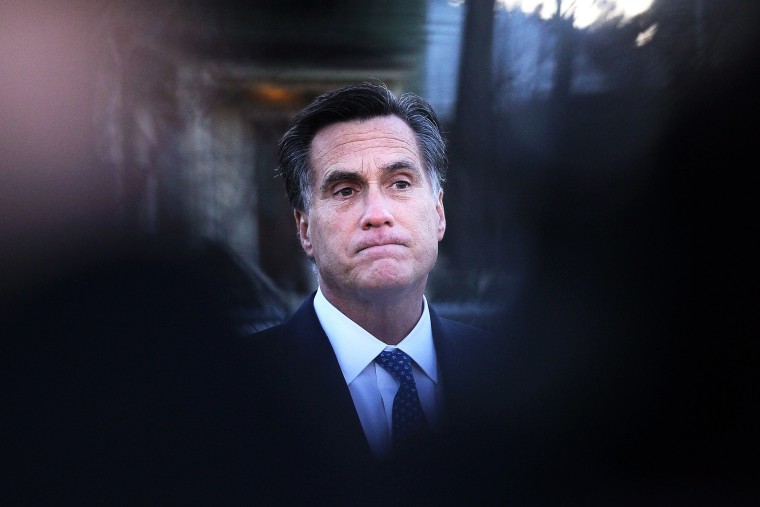So, which of these two scenarios seems harder to believe: discredited neocons
lecturing officials on U.S. policy in Iraq, or Mitt Romney
giving advice to Republicans on how to win presidential elections? In a dizzying twist, the weekend offered plenty of both.
Mitt Romney may not be a candidate for president in 2016, but on Sunday he offered up plenty of ways to attack Democratic frontrunner Hillary Clinton should she run. "The playbook, I believe, is to look at her record," Romney said on NBC's Meet The Press. "Consider what's happened around the world when she was secretary of state."
Romney
added that the crisis in Iraq is the Obama administration's fault. He didn't mention insurgents, ISIS, Maliki's broken promises, Iraq's generations of sectarian conflicts, or the catastrophic mistakes of the Bush/Cheney administration.
Putting aside the propriety of a failed presidential candidate taking cheap shots at the man who defeated him -- and one of the president's possible successors -- it's worth pausing to appreciate just how ill-suited Romney is to even broach this subject in the first place.
As we
discussed in March, the former one-term governor with no foreign policy experience, has long struggled when it comes to international affairs. Indeed,
looking back at 2012, let’s not forget that Romney’s own advisers
said “they have engaged with him so little on issues of national security that they are uncertain what camp he would fall into, and are uncertain themselves about how he would govern.”
Thomas Friedman
noted shortly before the election, “For the first time in a long, long time, a Democrat is running for president and has the clear advantage on national security policy.” Part of this, the columnist argued, is that Mitt Romney acts “as if he learned his foreign policy at the International House of Pancakes.”
And yet, despite all of this, Romney not only presents himself as an authority on foreign policy, he even has fans urging him to launch a third presidential campaign.
Romney held his latest "summit" in Utah over the weekend, bringing together a variety of Republican leaders, donors, business leaders, and likely national candidates, and according to the
Washington Post's
report, there was quite a bit of chatter about the host.
[T]he scene at a luxury resort in the Rocky Mountains quickly became a Romney revival. Minutes after the 2012 Republican presidential nominee welcomed his 300 guests, Joe Scarborough, the MSNBC host and former GOP congressman, urged them to begin a "Draft Romney" movement in 2016. "This is the only person that can fill the stage," Scarborough said at the opening-night private dinner, according to attendees. [...] [I]n hallway chats and over cocktails, they've been abuzz about recruiting someone else -- Romney -- into his third presidential race.
By all appearances, nothing will come of this chatter and Romney insists he won't try again. But the fact that the scuttlebutt exists at all speaks to a larger truth.
For quite a while, the conventional wisdom held that Republicans have a good problem: there's no 2016 frontrunner, and Democrats may have a formidable candidate in mind, but there are so many credible GOP contenders that the party won't just have to pick the least-bad alternative in a weak field. Rank-and-file Republicans, the argument goes, will have a stable of thoroughbreds to choose from.
But how much of this talk is a sham?
At least for some in the party, the optimism is misplaced. They're looking at the would-be leaders of their party -- Cruz, Paul, Christie, Rubio, Ryan, Jindal, et al -- and thinking, "Maybe the third time would be the charm with Mitt?" That says far more about the likely 2016 field than it does about the failed 2012 candidate.
